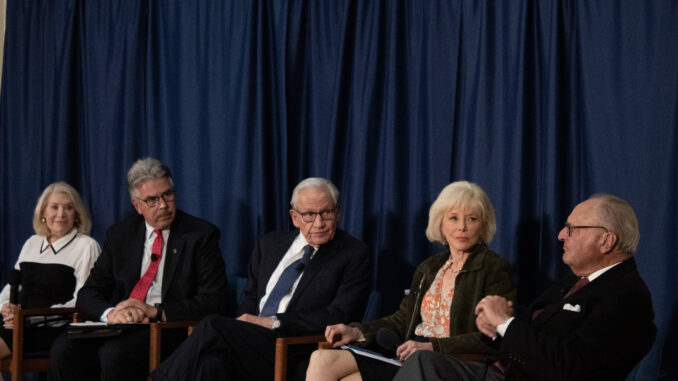
Emily Ambery & Megan Trotter | Layout Editor & News Editor
WASHINGTON, D.C. – Fifty years ago, then-president Richard Nixon fired special prosecutor Archibald Cox in what became known as the “Saturday Night Massacre.”
It was the turning point in the Watergate probe that ultimately resulted in the first resignation of a sitting president. It also set a precedent that still holds true in the United States today: No man is above the law.
To commemorate the historic event, Duquesne University hosted a retrospective panel at the National Press Club in Washington, D.C., on Wednesday featuring journalist Bob Woodward, whose investigative work with Carl Bernstein uncovered criminal activity in the Nixon administration.
Duquesne University President Ken Gormley moderated the discussion with Woodward, CBS-TV journalist Lesley Stahl, Watergate Special Prosecution Force members Jill Wine-Banks and Richard Ben-Veniste, and J.T. Smith, who served as advisor to then-Attorney General Elliot Richardson.
The panel included special remarks from Cox’s granddaughter, Colorado Supreme Court Justice Melissa Hart. Her grandfather served as the special prosecutor investigating the Watergate scandal – until he was fired.
“Cox is an amazing example of someone who took his responsibility seriously,” Ben-Veniste said. “[Cox] was the fairest person Nixon could have wanted for that job.”
Retired U.S. Supreme Court Justice Stephen Breyer, who gave opening and closing remarks, said he learned a lot in watching how Department of Justice officials navigated the Watergate investigation.
From Richardson, Breyer said, he learned “You make a promise to the Senate, you make a promise to the American people.”
From Cox, Breyer said, “You know what you do in this job? You do your job.”
On June 17, 1972, five men were caught breaking into Democratic National Committee headquarters at the Watergate Hotel on behalf of the Nixon administration, their pockets lined with more than $2,000 in cash. Washington Post reporters Woodward and Bernstein followed the story and corruption to the highest office in the United States.
As part of his investigation as special prosecutor, Cox requested from the Nixon administration its secretly recorded tapes, but he was turned down. He and his legal team then subpoenaed the White House, but Nixon refused to give up the recordings.
Cox was committed to following proper procedure, the panel said.
Paranoid and looking to evade prosecution, then-president Nixon offered to compromise by allowing 72-year-old U.S. Sen. John C. Stennis of Mississippi to listen and provide a summary of the tapes. Cox publicly refused the offer of the summarized tapes in a conference at the National Press Club building and was promptly fired by Nixon later that evening.
“Hate was driving him into a series of actions,” Woodward said. “That hate was the poison that destroyed him.”
Despite Nixon’s best efforts to avoid prosecution, on Nov. 1, 1973, newly-appointed special prosecutor Leon Jaworski subpoenaed 64 taped conversations.
Wine-Banks believes Nixon originally did not realize how incriminating the tapes were until he received the subpoena. Stahl shared a similar sentiment about Nixon finding himself participating in a cover up.
“He erased 18 minutes. God, who knows what was on that,” Stahl said.
Cox’s commitment to the truth and the Post’s reporting led Nixon to be the first and only president to resign from office, cementing the Rule of Law.
“We say regularly that ours is a government of laws, not of men. That no one is above the law. We face challenges to that all the time,” Hart said.
Despite Woodward and Bernstein’s investigative fame now, Woodward told the Duke that the general public did not believe their articles for months and thought “Nixon’s too smart to do this.”
Attendees got a firsthand look into journalism’s role in enforcing the Rule of Law.
“Everyone downplays the role of journalism, but this is the kind of work that makes the world better,” said attendee and class of 1965 Alum David Brugger.
Panelists drew parallels between the Saturday Night Massacre under Nixon and the Jan. 6, 2021, insurrection under former president Donald Trump.
“I believe that Richard Nixon did not pose an existential threat to our democracy,” Ben-Veniste said. “I cannot say that about Donald Trump.”
Ben-Veniste compared those in Watergate, like Cox and Richardson who sacrificed future political careers to pursue the truth, to former Vice President Mike Pence. According to Ben-Veniste, Pence sacrificed his career in ultimately denying stolen election conspiracies perpetuated by former president Trump.
Woodward described their similarity as “a lust for political power.”
“There were times where we really did think he was committing a coup-d’etat,” Stahl said. “We thought that he was going to send the military in, and there was fear that he was going to destroy the democracy.”
Before Watergate there was no notion of a class on legal ethics, Hart said. However, after the event, the American Bar Association declared that in order to be an accredited law school a class on legal ethics must be offered.
After studying under Cox while attending Harvard University, Gormley was inspired to share his legacy. So much so that Gormley published a book about him, “Archibald Cox: Conscience of a Nation,” published in 1999.
“I’ve done these programs because I think it’s important for students and the American public to learn what it takes for people of integrity to be in positions of public trust and have to make solitary decisions,” Gormley said.
Wine-Banks fears how misinformation has corrupted the rule of law when it comes to Trump.
“To me all our institutions have been discredited now. The press. Congress. The court. And Donald Trump did this, and it isn’t over. The story isn’t finished. We are in the middle of it. I personally despair,” Stahl said.
Woodward returned to the roots of the presidency and likened Nixon and Trump to Washington’s Farewell Address in 1796 in which he said that some day unprincipled men will hold that office.
“I think in retrospect Richard Nixon looks like one of nature’s noblemen,” Smith said.





